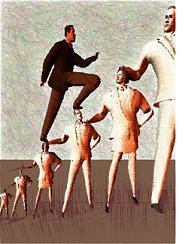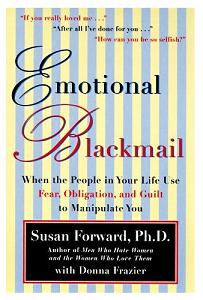
Odds are you've run across one of these characters in your career. They're glib, charming, manipulative, deceitful, ruthless -- and very, very destructive. And there may be lots of them in America's corner offices.
One of the most provocative ideas about business in this decade so far surfaced in a most unlikely place. The forum wasn't the Harvard Business School or one of those $4,000-a-head conferences where Silicon Valley's venture capitalists search for the next big thing. It was a convention of Canadian cops in the far-flung province of Newfoundland. The speaker, a 71-year-old professor emeritus from the University of British Columbia, remains virtually unknown in the business realm. But he's renowned in his own field: criminal psychology. Robert Hare is the creator of the Psychopathy Checklist. The 20-item personality evaluation has exerted enormous influence in its quarter-century history. It's the standard tool for making clinical diagnoses of psychopaths -- the 1% of the general population that isn't burdened by conscience. Psychopaths have a profound lack of empathy. They use other people callously and remorselessly for their own ends. They seduce victims with a hypnotic charm that masks their true nature as pathological liars, master con artists, and heartless manipulators. Easily bored, they crave constant stimulation, so they seek thrills from real-life "games" they can win -- and take pleasure from their power over other people.
On that August day in 2002, Hare gave a talk on psychopathy to about 150 police and law-enforcement officials. He was a legendary figure to that crowd. The FBI and the British justice system have long relied on his advice. He created the P-Scan, a test widely used by police departments to screen new recruits for psychopathy, and his ideas have inspired the testing of firefighters, teachers, and operators of nuclear power plants.
According to the Canadian Press and Toronto Sun reporters who rescued the moment from obscurity, Hare began by talking about Mafia hit men and sex offenders, whose photos were projected on a large screen behind him. But then those images were replaced by pictures of top executives from WorldCom, which had just declared bankruptcy, and Enron, which imploded only months earlier. The securities frauds would eventually lead to long prison sentences for WorldCom CEO Bernard Ebbers and Enron CFO Andrew Fastow.
"These are callous, cold-blooded individuals," Hare said.
"They don't care that you have thoughts and feelings. They have no sense of guilt or remorse." He talked about the pain and suffering the corporate rogues had inflicted on thousands of people who had lost their jobs, or their life's savings. Some of those victims would succumb to heart attacks or commit suicide, he said.
Then Hare came out with a startling proposal. He said that the recent corporate scandals could have been prevented if CEOs were screened for psychopathic behavior. "Why wouldn't we want to screen them?" he asked. "We screen police officers, teachers. Why not people who are going to handle billions of dollars?"
It's Hare's latest contribution to the public awareness of "corporate psychopathy." He appeared in the 2003 documentary The Corporation, giving authority to the film's premise that corporations are "sociopathic" (a synonym for "psychopathic") because they ruthlessly seek their own selfish interests -- "shareholder value" -- without regard for the harms they cause to others, such as environmental damage.
Is Hare right? Are corporations fundamentally psychopathic organizations that attract similarly disposed people? It's a compelling idea, especially given the recent evidence. Such scandals as Enron and WorldCom aren't just aberrations; they represent what can happen when some basic currents in our business culture turn malignant. We're worshipful of top executives who seem charismatic, visionary, and tough. So long as they're lifting profits and stock prices, we're willing to overlook that they can also be callous, conning, manipulative, deceitful, verbally and psychologically abusive, remorseless, exploitative, self-delusional, irresponsible, and megalomaniacal. So we collude in the elevation of leaders who are sadly insensitive to hurting others and society at large.
But wait, you say: Don't bona fide psychopaths become serial killers or other kinds of violent criminals, rather than the guys in the next cubicle or the corner office? That was the conventional wisdom. Indeed, Hare began his work by studying men in prison. Granted, that's still an unusually good place to look for the conscience-impaired. The average Psychopathy Checklist score for incarcerated male offenders in North America is 23.3, out of a possible 40. A score of around 20 qualifies as "moderately psychopathic." Only 1% of the general population would score 30 or above, which is "highly psychopathic," the range for the most violent offenders. Hare has said that the typical citizen would score a 3 or 4, while anything below that is "sliding into sainthood."
On the broad continuum between the ethical everyman and the predatory killer, there's plenty of room for people who are ruthless but not violent. This is where you're likely to find such people as Ebbers, Fastow, ImClone CEO Sam Waksal, and hotelier Leona Helmsley. We put several big-name CEOs through the checklist, and they scored as "moderately psychopathic"; our quiz on page 48 lets you try a similar exercise with your favorite boss. And this summer, together with New York industrial psychologist Paul Babiak, Hare begins marketing the B-Scan, a personality test that companies can use to spot job candidates who may have an MBA but lack a conscience. "I always said that if I wasn't studying psychopaths in prison, I'd do it at the stock exchange," Hare told Fast Company. "There are certainly more people in the business world who would score high in the psychopathic dimension than in the general population. You'll find them in any organization where, by the nature of one's position, you have power and control over other people and the opportunity to get something."
Tere's evidence that the business climate has become even more hospitable to psychopaths in recent years. In pioneering long-term studies of psychopaths in the workplace, Babiak focused on a half-dozen unnamed companies: One was a fast-growing high-tech firm, and the others were large multinationals undergoing dramatic organizational changes -- severe downsizing, restructuring, mergers and acquisitions, and joint ventures. That's just the sort of corporate tumult that has increasingly characterized the U.S. business landscape in the last couple of decades. And just as wars can produce exciting opportunities for murderous psychopaths to shine (think of Serbia's Slobodan Milosevic and Radovan Karadzic), Babiak found that these organizational shake-ups created a welcoming environment for the corporate killer. "The psychopath has no difficulty dealing with the consequences of rapid change; in fact, he or she thrives on it," Babiak claims. "Organizational chaos provides both the necessary stimulation for psychopathic thrill seeking and sufficient cover for psychopathic manipulation and abusive behavior."
And you can make a compelling case that the New Economy, with its rule-breaking and roller-coaster results, is just dandy for folks with psychopathic traits too. A slow-moving old-economy corporation would be too boring for a psychopath, who needs constant stimulation. Its rigid structures and processes and predictable ways might stymie his unethical scheming. But a charge-ahead New Economy maverick -- an Enron, for instance -- would seem the ideal place for this kind of operator.
But how can we recognize psychopathic types? Hare has revised his Psychopathy Checklist (known as the PCL-R, or simply "the Hare") to make it easier to identify so-called subcriminal or corporate psychopaths. He has broken down the 20 personality characteristics into two subsets, or "factors." Corporate psychopaths score high on Factor 1, the "selfish, callous, and remorseless use of others" category. It includes eight traits: glibness and superficial charm; grandiose sense of self-worth; pathological lying; conning and manipulativeness; lack of remorse or guilt; shallow affect (i.e., a coldness covered up by dramatic emotional displays that are actually playacting); callousness and lack of empathy; and the failure to accept responsibility for one's own actions. Sound like anyone you know? (Corporate psychopaths score only low to moderate on Factor 2, which pinpoints "chronically unstable, antisocial, and socially deviant lifestyle," the hallmarks of people who wind up in jail for rougher crimes than creative accounting.)
This view is supported by research by psychologists Belinda Board and Katarina Fritzon at the University of Surrey, who interviewed and gave personality tests to 39 high-level British executives and compared their profiles with those of criminals and psychiatric patients. The executives were even more likely to be superficially charming, egocentric, insincere, and manipulative, and just as likely to be grandiose, exploitative, and lacking in empathy. Board and Fritzon concluded that the businesspeople they studied might be called "successful psychopaths." In contrast, the criminals -- the "unsuccessful psychopaths" -- were more impulsive and physically aggressive.
The Factor 1 psychopathic traits seem like the playbook of many corporate power brokers through the decades. Manipulative? Louis B. Mayer was said to be a better actor than any of the stars he employed at MGM, able to turn on the tears at will to evoke sympathy during salary negotiations with his actors. Callous? Henry Ford hired thugs to crush union organizers, deployed machine guns at his plants, and stockpiled tear gas. He cheated on his wife with his teenage personal assistant and then had the younger woman marry his chauffeur as a cover. Lacking empathy? Hotel magnate Leona Helmsley shouted profanities at and summarily fired hundreds of employees allegedly for trivialities, like a maid missing a piece of lint. Remorseless? Soon after Martin Davis ascended to the top position at Gulf & Western, a visitor asked why half the offices were empty on the top floor of the company's Manhattan skyscraper. "Those were my enemies," Davis said. "I got rid of them." Deceitful? Oil baron Armand Hammer laundered money to pay for Soviet espionage. Grandiosity? Thy name is Trump.
In the most recent wave of scandals, Enron's Fastow displayed many of the corporate psychopath's traits. He pressured his bosses for a promotion to CFO even though he had a shaky grasp of the position's basic responsibilities, such as accounting and treasury operations. Suffering delusions of grandeur after just a little time on the job, Fastow ordered Enron's PR people to lobby CFO magazine to make him its CFO of the Year. But Fastow's master manipulation was a scheme to loot Enron. He set up separate partnerships, secretly run by himself, to engage in deals with Enron. The deals quickly made tens of millions of dollars for Fastow -- and prettified Enron's financials in the short run by taking unwanted assets off its books. But they left Enron with time bombs that would ultimately cause the company's total implosion -- and lose shareholders billions. When Enron's scandals were exposed, Fastow pleaded guilty to securities fraud and agreed to pay back nearly $24 million and serve 10 years in prison.
Chainsaw" Al Dunlap might score impressively on the corporate Psychopathy Checklist too. What do you say about a guy who didn't attend his own parents' funerals? He allegedly threatened his first wife with guns and knives. She charged that he left her with no food and no access to their money while he was away for days. His divorce was granted on grounds of "extreme cruelty." That's the characteristic that endeared him to Wall Street, which applauded when he fired 11,000 workers at Scott Paper, then another 6,000 (half the labor force) at Sunbeam. Chainsaw hurled a chair at his human-resources chief, the very man who approved the handgun and bulletproof vest on his expense report. Dunlap needed the protection because so many people despised him. His plant closings kept up his reputation for ruthlessness but made no sense economically, and Sunbeam's financial gains were really the result of Dunlap's alleged book cooking. When he was finally exposed and booted, Dunlap had the nerve to demand severance pay and insist that the board reprice his stock options. Talk about failure to accept responsibility for one's own actions.
While knaves such as Fastow and Dunlap make the headlines, most horror stories of workplace psychopathy remain the stuff of frightened whispers. Insiders in the New York media business say the publisher of one of the nation's most famous magazines broke the nose of one of his female sales reps in the 1990s. But he was considered so valuable to the organization that the incident didn't impede his career.
Most criminals -- whether psychopathic or not -- are shaped by poverty and often childhood abuse as well. In contrast, corporate psychopaths typically grew up in stable, loving families that were middle class or affluent. But because they're pathological liars, they tell romanticized tales of rising from tough, impoverished backgrounds. Dunlap pretended that he grew up as the son of a laid-off dockworker; in truth, his father worked steadily and raised his family in suburban comfort. The corporate psychopaths whom Babiak studied all went to college, and a couple even had PhDs. Their ruthless pursuit of self-interest was more easily accomplished in the white-collar realm, which their backgrounds had groomed them for, rather than the criminal one, which comes with much lousier odds.
Psychopaths succeed in conventional society in large measure because few of us grasp that they are fundamentally different from ourselves. We assume that they, too, care about other people's feelings. This makes it easier for them to "play" us. Although they lack empathy, they develop an actor's expertise in evoking ours. While they don't care about us, "they have an element of emotional intelligence, of being able to see our emotions very clearly and manipulate them," says Michael Maccoby, a psychotherapist who has consulted for major corporations.
Psychopaths are typically very likable. They make us believe that they reciprocate our loyalty and friendship. When we realize that they were conning us all along, we feel betrayed and foolish. "People see sociopathy in their personal lives, and they don't have a clue that it has a label or that others have encountered it," says Martha Stout, a psychologist at the Harvard Medical School and the author of the recent best-seller The Sociopath Next Door: The Ruthless Versus the Rest of Us (Broadway Books, 2005). "It makes them feel crazy or alone. It goes against our intuition that a small percentage of people can be so different from the rest of us -- and so evil. Good people don't want to believe it."
Of course, cynics might say that it can be an advantage to lack a conscience. That's probably why major investors installed Dunlap as the CEO of Sunbeam: He had no qualms about decimating the workforce to impress Wall Street. One reason outside executives get brought into troubled companies is that they lack the emotional stake in either the enterprise or its people. It's easier for them to act callously and remorselessly, which is exactly what their backers want. The obvious danger of the new B-Scan test for psychopathic tendencies is that companies will hire or promote people with high scores rather than screen them out. Even Babiak, the test's codeveloper, says that while "a high score is a red flag, sometimes middle scores are okay. Perhaps you don't want the most honest and upfront salesman."
Indeed, not every aberrant boss is necessarily a corporate psychopath. There's another personality that's often found in the executive suite: the narcissist. While many psychologists would call narcissism a disorder, this trait can be quite beneficial for top bosses, and it's certainly less pathological than psychopathy. Maccoby's book The Productive Narcissist: The Promise and Perils of Visionary Leadership (Broadway Books, 2003) portrays the narcissistic CEO as a grandiose egotist who is on a mission to help humanity in the abstract even though he's often insensitive to the real people around him. Maccoby counts Apple's Steve Jobs, General Electric's Jack Welch, Intel's Andy Grove, Microsoft's Bill Gates, and Southwest Airlines' Herb Kelleher as "productive narcissists," or PNs. Narcissists are visionaries who attract hordes of followers, which can make them excel as innovators, but they're poor listeners and they can be awfully touchy about criticism. "These people don't have much empathy," Maccoby says. "When Bill Gates tells someone, 'That's the stupidest thing I've ever heard,' or Steve Jobs calls someone a bozo, they're not concerned about people's feelings. They see other people as a means toward their ends. But they do have a sense of changing the world -- in their eyes, improving the world. They build their own view of what the world should be and get others recruited to their vision. Psychopaths, in contrast, are only interested in self."
Maccoby concedes that productive narcissists can become "drunk with power" and turn destructive. The trick, he thinks, is to pair a productive narcissist with a "productive obsessive," or conscientious, control-minded manager. Think of Grove when he was matched with chief operating officer Craig Barrett, Gates with president Steve Ballmer, Kelleher with COO Colleen Barrett, and Oracle's Larry Ellison with COO Ray Lane and CFO Jeff Henley. In his remarkably successful second tour of duty at Apple, Jobs has been balanced by steady, competent behind-the-scenes players such as Timothy Cook, his executive vice president for sales and operations.
But our culture's embrace of narcissism as the hallmark of admired business leaders is dangerous, Babiak maintains, since "individuals who are really psychopaths are often mistaken for narcissists and chosen by the organization for leadership positions." How does he distinguish the difference between the two types? "In the case of a narcissist, everything is me, me, me," Babiak explains. "With a psychopath, it's 'Is it thrilling, is it a game I can win, and does it hurt others?' My belief is a psychopath enjoys hurting others."
Intriguingly, Babiak believes that it's extremely unlikely for an entrepreneurial founder-CEO to be a corporate psychopath because the company is an extension of his own ego -- something he promotes rather than plunders. "The psychopath has no allegiance to the company at all, just to self," Babiak says. "A psychopath is playing a short-term parasitic game." That was the profile of Fastow and Dunlap -- guys out to profit for themselves without any concern for the companies and lives they were wrecking. In contrast, Jobs and Ellison want their own companies to thrive forever -- indeed, to dominate their industries and take over other fields as well. "An entrepreneurial founder-CEO might have a narcissistic tendency that looks like psychopathy," Babiak says. "But they have a vested interest: Their identity is wrapped up with the company's existence. They're loyal to the company." So these types are ruthless not only for themselves but also for their companies, their extensions of self.
The issue is whether we will continue to elevate, celebrate, and reward so many executives who, however charismatic, remain indifferent to hurting other people. Babiak says that while the first line of defense against psychopaths in the workplace is screening job candidates, the second line is a "culture of openness and trust, especially when the company is undergoing intense, chaotic change."
Europe is far ahead of the United States in trying to deal with psychological abuse and manipulation at work. The "antibullying" movement in Europe has produced new laws in France and Sweden. Harvard's Stout suggests that the relentlessly individualistic culture of the United States contributes a lot to our problems. She points out that psychopathy has a dramatically lower incidence in certain Asian cultures, where the heritage has emphasized community bonds rather than glorified self-interest. "If we continue to go this way in our Western culture," she says, "evolutionarily speaking, it doesn't end well."
The good news is that we can do something about corporate psychopaths. Scientific consensus says that only about 50% of personality is influenced by genetics, so psychopaths are molded by our culture just as much as they are born among us. But unless American business makes a dramatic shift, we'll get more Enrons -- and deserve them.
Alan Deutschman is a Fast Company senior writer based in San Francisco.
 GAINESVILLE, Fla. — When Robert Browning wrote “grow old along with me, the best is yet to be,” he had no inkling of a future University of Florida study showing that narcissists are more interested in sexual pleasure than lasting intimacy.
GAINESVILLE, Fla. — When Robert Browning wrote “grow old along with me, the best is yet to be,” he had no inkling of a future University of Florida study showing that narcissists are more interested in sexual pleasure than lasting intimacy.














